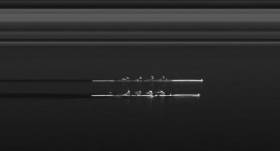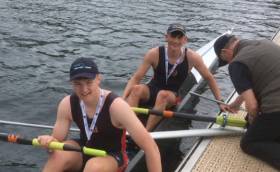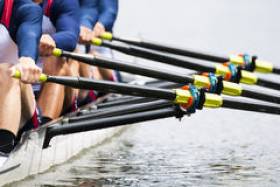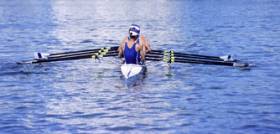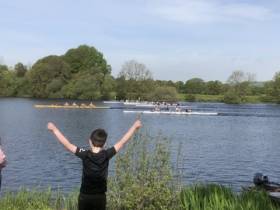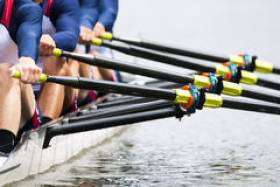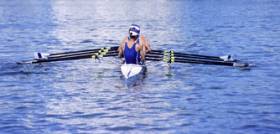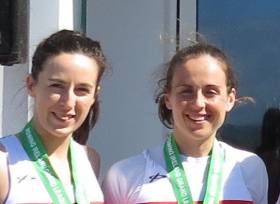Displaying items by tag: St Michael's
Cork Clubs on a Run at Irish Championships
#Rowing: Cork clubs had a set of good results in the first session of Sunday finals at the Irish Rowing Championships at the National Rowing Centre.
Cork Boat Club's junior women's pair started the ball rolling, while Skibbereen then took their second title of Championships as Aodhan Burns proved a strong winner of the lightweight single sculls.
Margaret Cremen of UCC had a huge win in the lightweight single sculls, and Lee added the junior men's double to the junior quadruple title they had won on Saturday.
The tighest finish came in the men's club coxed four. NUIG made a tremendous effort to catch St Michael's of Limerick but they fell short by just .329 of a second.
Commercial of Dublin and Fermanagh's Enniskillen Royal Boat Club are having a good reatta. Enniskillen won the men's intermediate pair, while Commercial won the womens intermediate coxed four.
St Michael's Race to Silver at Dorney Lake
#Rowing: St Michael’s of Limerick had an excellent day at the National Schools Regatta at Dorney Lake. Their Girls’ Championship Four took silver behind Henley, pushing the elite English crew right to the finish.
Ryan Spelman of St Michael’s also featured in one of the prestigious finals – he took fifth in the A Final of the Championship Single.
Earlier, Enniskillen’s Peter Murphy and Sam Balcombe took bronze in the Championship Pair and Enniskillen were just one place outside the medals in the Boys Championship Four.
Coleraine Grammar School finished fifth in the Junior 16 Girls Double.
Enniskillen in the Medals at National Schools Regatta
#Rowing: Enniskillen’s Sam Balcombe and Peter Murphy took a fine third place in the men’s Championship Pair at the National Schools Regatta at Dorney Lake today.
On Saturday, Enniskillen had won gold in the Junior 16 Girls coxed four by a big margin.
Ryan Spelman of St Michael’s took his place in the A Final of the Championship Single Sculls, and finished well to challenge the leaders. He took fifth.
Coleraine Grammar School also took fifth in the final of the Junior 16 Girls Double.
St Michael's Head of the River Cancelled
#Rowing: The St Michael’s Head of the River, scheduled for Saturday, March 16th, has been cancelled. The weather forecast for Limerick changed, and the organisers felt they could not be certain of running a safe event. Monday was considered for a rescheduled event, but some clubs could not change their plans.
O'Donovan and O'Neill Shine in Dirty Dozen Test
#Rowing: Rory O’Neill and James O’Donovan of Castleconnell shared top billing in the men’s junior 18 rankings after the concluding stage of the Dirty Dozen Challenge. Eabha Benson of St Michael’s won the women’s junior 18 series. There were four rounds, beginning in October (three kilometres) and running through November (5k) and December and January (6k).
| Category | Shell | Rower(-s) | Bow # | Place | Course time |
|---|---|---|---|---|---|
| W J16 | 1X | C. Leahy | 112 | 1 | 00:14:50 |
| W J16 | 1X | J. O'Brien (CCBC) | 110 | 2 | 00:14:51 |
| W J16 | 1X | R. Hickey (Shannon Rowing Club) | 114 | 3 | 00:15:00 |
| W J16 | 1X | C. Kiely (Castleconnell) | 109 | 4th | 00:15:02 |
| W J16 | 1X | G. Fitzgerald (CCBC) | 113 | 5th | 00:15:29 |
| W J16 | 1X | C. Ni Dhonabhain (SRC) | 111 | DNF | |
| W J18 | 1X | �. Benson (SMRC) | 76 | 1 | 00:28:45 |
| W J18 | 1X | N. Kiely (Castleconnell BC) | 74 | 2 | 00:29:04 |
| W J18 | 1X | C. KIRWAN (SMRC) | 75 | 3 | 00:29:58 |
| W J18 | 1X | S. Gilmore (CCBC) | 77 | 4th | 00:30:00 |
| W J18 | 1X | S. Fitzgerald (TRC) | 78 | 5th | 00:31:05 |
| W J18 | 1X | C. Storan (SMRC) | 82 | 6th | 00:31:42 |
| W J18 | 1X | C. Kelly (Castleconnell BC) | 79 | 7th | 00:33:37 |
| W J18 | 1X | A. King (SMRC) | 81 | 8th | 00:33:48 |
| W J18 | 1X | H. Bradshaw (CCBC) | 80 | 9th | 00:34:12 |
| W J18 | 1X | O. Murphy (St Michaels) | 84 | 10th | 00:34:47 |
| W J18 | 1X | �. Phillips (SMRC) | 83 | 11th | 00:37:41 |
| W J18 | 1X | L. O'Brien (Castleconnell Boat Club) | 73 | DNF | |
| W OPEN | 1X | E. Redlichova (SMRC) | 85 | DNF | |
| W U21 | 1X | C. O'Brien (Castleconnell boat club) | 86 | 1 | 00:28:37 |
| W U23 | 1X | S. Murphy (SMRC) | 87 | 1 | 00:32:03 |
| W U23 Lt Wt | 1X | N. Hartney (SMRC) | 88 | 1 | 00:29:34 |
| W J16 | 2- | F. Gleeson (Shannon rowing club) | |||
| A. Curtin (shannon rowing club) | 116 | 1 | 00:13:38 | ||
| W J16 | 2- | E. McMahon (CCBC) | |||
| T. Mulready (Ccbc) | 117 | 2 | 00:14:04 | ||
| W J16 | 2- | C. Gleeson (Shannon rowing club) | |||
| A. Caffrey (Shannon) | 115 | DNF | |||
| W J18 | 2- | S. Byrnes (CCBC) | |||
| N. Silke (Castleconnell boat club) | 92 | 1 | 00:27:44 | ||
| W J18 | 2- | E. Mcinerney (Smrc) | |||
| E. Murphy (SMRC) | 89 | 2 | 00:28:15 | ||
| W J18 | 2- | A. Mckeon (Smrc) | |||
| M. O'Byrne (SMRC) | 93 | 3 | 00:29:10 | ||
| W J18 | 2- | N. Jones (SMRC) | |||
| K. McGann (SMRC) | 94 | 4th | 00:30:51 | ||
| W J18 | 2- | S. Broggy (Athlunkard Boat Club) | |||
| M. Malone (Athlunkard Boat Club) | 90 | 5th | 00:31:08 | ||
| M J16 | 1X | P. Mcinerney (Smrc) | 105 | 1 | 00:13:11 |
| M J16 | 1X | D. Foley (SMRC) | 103 | 2 | 00:13:12 |
| M J16 | 1X | G. O'Donoghue (Shannon Rowing Club) | 97 | 3 | 00:13:21 |
| M J16 | 1X | J. Cunningham (Castleconnell) | 96 | 4th | 00:13:41 |
| M J16 | 1X | T. Byrne | 99 | 5th | 00:13:44 |
| M J16 | 1X | I. Byrne Delimata (Castleconnell) | 98 | 6th | 00:13:49 |
| M J16 | 1X | D. De Brun (SMRC) | 104 | 7th | 00:13:59 |
| M J16 | 1X | N. Larkin Damm (Tralee Rowing CLUB) | 102 | 8th | 00:14:47 |
| M J16 | 1X | S. Cunningham (CCBC) | 100 | DNF | |
| M J16 | 1X | C. Oconnell (Waterville lake rowing cl...) | 101 | DNF | |
| M J18 | 1X | R. O'Neill (Castleconnell) | 59 | 1 | 00:25:39 |
| M J18 | 1X | J. O Donovan (CCBC) | 57 | 1 | 00:25:39 |
| M J18 | 1X | M. English (St Michaels Rowing Club) | 58 | 3 | 00:26:59 |
| M J18 | 1X | J. Scanlon France (ABC) | 60 | 4th | 00:32:50 |
| M J18 Lt Wt | 1X | B. France (St. Michaels) | 61 | 1 | 00:28:22 |
| M J18 Lt Wt | 1X | C. Bowen (Castleconnell boat club) | 62 | 2 | 00:29:03 |
| M Master B | 1X | R. Egan (Ccbc) | 63 | 1 | 00:27:01 |
| M Master C | 1X | c. Byrne (CCBC) | 64 | 1 | 00:28:32 |
| M OPEN | 1X | D. O'Connor (St. Michael's Rowing...) | 50 | 1 | 00:24:45 |
| M U21 | 1X | R. Spelman (Smrc) | 51 | 1 | 00:25:23 |
| M U21 | 1X | C. Mulready (Castleconnel) | 52 | 2 | 00:26:53 |
| M U21 | 1X | J. Desmond (Caslteconnell) | 53 | 3 | 00:28:16 |
| M U21 | 1X | A. King (Athlunkard Boat Club) | 54 | DNF | |
| M U23 | 1X | A. Lennon (St Michaels Rowing Club) | 55 | DNF | |
| M J15 | 2- | R. Lyons (Castleconnell) | |||
| A. SWEENEY (Ccbc) | 106 | 1 | 00:13:22 | ||
| M J16 | 2- | E. Gilmartin (CCBC) | |||
| J. McGrath (CCBC) | 107 | 1 | 00:12:48 | ||
| M J16 | 2- | P. Mcinerney (Smrc) | |||
| D. Hartney (SMRC) | 108 | 2 | 00:13:28 | ||
| M J18 | 2- | R. O Gorman (St.Michaels Rowing Club) | |||
| D. Hartney (SMRC) | 69 | 1 | 00:25:36 | ||
| M J18 Lt Wt | 2- | S. Fitzgerald (CCBC) | |||
| C. Nolan (Castleconnell) | 70 | 1 | 00:26:50 | ||
| M J18 Lt Wt | 2- | C. Foster (SMRC) | |||
| C. Kemp (SMRC) | 72 | 2 | 00:27:46 | ||
| M J18 Lt Wt | 2- | A. McFerran (CCBC) | |||
| E. Healy (Castleconnell Boat Club) | 71 | 3 | 00:28:09 | ||
| M Master B | 2- | P. Williams (CCBC) | |||
| E. Meskell (CCBC) | 65 | 1 | 00:26:05 | ||
| M Master C | 2- | k. mc donald | |||
| M. O'Callaghan (Shannon rowing club) | 66 | DNF | |||
| M U21 | 2- | J. O Brien (Castleconnel Boat Club) | |||
| C. Feely (Castleconnel rowing club) | 67 | DNF | |||
| M U23 | 2- | T. McKeon (St. Michael's rowing...) | |||
| J. Cuddy (SMRC) | 68 | 1 | 00:24:31 |
#Rowing: The Workmen’s junior women’s double took a silver at the National Schools’ Regatta at Dorney Lake in England today. In the Championship Doubles, Annie O’Donoghue and Ciara Browne finished one and a half lengths down on Latymer Upper School. Ciara Moynihan of Workmen’s finished seventh in the A Final of the Championship Singles, while Molly Curry of Coleraine Grammar School took control of the B Final and won.
Enniskillen took silver in the Boys’ Non-Championship Eights, and their girls’ junior 16 coxed four matched them in their A Final. Ireland clubs placed second and third in the B Final of the Girls’ Championship/Non Championship Eights.
British National Schools’ Regatta, Dorney Lake (Selected Results; Irish interest)
Saturday
Boys
Championship/Non-Championship Eight – B Final: 3 Enniskillen RBC.
Girls
Championship/Non-Championship Eight – B Final: 2 Galway 7:35.72; 3 St Michael’s 7:45.46.
Junior 16 Four, coxed – A Final: 2 Enniskillen RBC 8:22.68.
Sculling, Double – Championship A Final: 2 Workmen’s (A O’Donoghue, C Browne) 8:06.37.
Single – Championship A Final: 7 Workmen’s (C Moynihan) 9:10.40. B Final: 1 Coleraine Grammar School (M Curry) 8:43.03.
Castleconnell Shine at Home Rowing Regatta
#Rowing: Castleconnell Sprint Regatta had a huge entry and a good day for rowing. The host club, which had amassed a set of fine results at Ghent regatta, did so again at their home regatta. They won the junior 15 eights for boys and girls. St Michael’s won the girls’ junior 16 eight. Athlunkard won the final race of the day, beating St Michael’s in the final of the men’s club two coxed four.
Castleconnell Sprint Regatta, Saturday (Selected Results)
Men
Eight – Jun 15: Castleconnell. Masters: Castleconnell.
Four – Club Two, coxed: Athlunkard. Jun 16, coxed: Castleconnell.
Sculling, Quadruple – Club Two, coxed: St Michael’s. Jun 18B, coxed: Muckross.
Double – Club Two: Workmen’s. Jun 18B: Workmen’s A.
Single – Club Two: Shandon (Diffley). Jun 18A: Castleconnell (D Martin).
Women
Eight – Masters: Univ of Limerick. Jun 16: St Michael’s. Jun 15: Castleconnell.
Four – Jun 18B, coxed: Shannon.
Sculling, Quadruple – Jun 18B, coxed: CRCC. Jun 16, coxed: Workmans.
Double – Club Two: Waterford. Jun 18B: CRCC.
Single – Club Two: Workmen’s (M Fleming). Novice: Cappoquin (B O’Rourke). Jun 18B: Muckross. Masters: Offaly (Nolan).
Tribesmen Off and St Michael's Moves Because of Weather
#Rowing: The Tribesmen Head of the River, set for Lough Rynn on Saturday (February 10th) has had to be called off because of a forecast of rain and gale force gusts of wind. The organisers hope to hold a deferred event in March.
The weather has caused a change in venue for another event. Flooding at O’Brien’s Bridge has forced the organisers of the St Michael’s Head of the River on February 24th to move it to the St Michael’s club on O’Callaghan’s Strand in Limerick.
Neptune Best Junior Eight as Irish Shine at Ghent
#Rowing: Neptune won the men’s junior 18 eight and Commercial were second at the Ghent International May Regatta in Belgium. Commercial’s Gillian Crowe and Hazel O’Neill won the women’s senior pair.
Commercial crews finished 1-2-3 of the eight crews which competed in the junior women’s pair.
Aaron Keogh of Three Castles won the junior 16 single sculls – first of 39 competitors and Jack Butler of Neptune was third of 28 in the junior 18 singles.
Cork took second in the women’s junior eight, while New Ross were third in the women’s junior quadruple.
Ghent International May Regatta, Belgium (Irish interest; selected results, finals)
Men
Eight: 1 Neptune 6:04.89, 2 Commercial 6:07.61.
Four, coxed – Jun 18: 1 Commercial 7:00.29 (two crews).
Pair – Sen: 2 Commercial (D Joyce, M Maher) 6:57.08. Under-23: 1 St Michael’s (T McKeon, D O’Byrne) 7:14.20, 3 St Michael’s (B McKeon, C Garvey) 7:15.78. Jun 18: 3 St Michael’s (T McKeon, D O’Byrne) 7:11.18.
Sculling
Quadruple – Jun 18: 2 Three Castles 6:21.19.
Double – Jun: 3 Three Castles (R Quinn, O Clune) 6:48.19.
Single: 3 S McKeown 7:25.96. Lightweight: 2 St Michael’s (D O’Connor) 7:21.71. Jun 18: 3 Neptune (J Butler) 7:42.19. Jun 16: 1 Three Castles (A Keogh) 7:38.98.
Women
Eight – Junior: 2 Cork 7:05.83, 3 Commercial 7:20.22.
Four – Jun: 2 Commercial 7:42.63.
Pair – Sen: 2 Commercial (G Crowe, H O’Neill) 7:50.48. Jun: 1 Commercial (A Keogh, S Maxwell) 8:14.43, 2 Commercial (G McNamara, K Dolan) 8:23.96, 3 Commercial (C Ryan, A O’Rourke) 8:39.88.
Sculling, Quadruple – Jun: 3 New Ross 7:22.57.
Irish In the Medals at Ghent Regatta
#Rowing: Irish clubs had some excellent placings on Saturday at the Ghent International May Regatta in Belgium. Commercial and Neptune finished first and second in the junior men’s eight and Commercial also finished second in the women’s junior eight and four, and second and third in the junior women’s pair. The Three Castles junior double of Rory Quinn and Oisin Clune took silver – second of 47 crews which competed. New Ross were the second-placed crew in the junior quadruple.
In the adult events, which generally had smaller entries, St Michael’s had wins through Declan O’Connor, Ben McKeon and Colm Garvey, while Skibbereen’s Orla Hayes won the lightweight women’s single. Sam McKeown of Queen’s University finished second to Dave Bell of Molesey in the senior single sculls.
Ghent International May Regatta, Belgium (Irish interest; selected results; Saturday)
Men
Eight – Junior: 1 Commercial 6:42.02, 2 Neptune 6:47.0.
Four – Junior: 2 Commercial 7:01.64. Four, coxed – Junior: 2 Neptune 7:13.78.
Pair – Senior: 1 Commercial (D Joyce, M Maher) 7:45.01 Under-23 (Two Crews): 1 St Michael’s (B McKeon, C Garvey) 8:22.06, 2 St Michael’s (T McKeon, D O’Byrne) 8:23.88. Lightweight Pair: 1 St Michael’s (B McKeon, C Garvey) 8:09.34. Junior: 2 St Michael’s (T McKeon, D O’Byrne) 7:36.89.
Quadruple – Junior: 2 Three Castles 6:48.14.
Double – Junior: 2 Three Castles (R Quinn, O Clune) 7:18.24.
Single – Senior: 2 Queen’s (S McKeown) 8:03.56. Lightweight: 1 St Michael’s (D O’Connor) 7:05.24. Under-23 Lightweight: 3 Queen’s (M Taylor) 8:13.94.
Women
Eight – Junior: 2 Commercial 7:52.67, 3 Cork BC 8:04.40.
Four – Junior: 2 Commercial 8:18.63, 3 New Ross 8:27.38.
Pair – Senior: 3 Commercial (H O’Neill, G Crowe) 9:06.60. Junior: 2 Commercial (A Keogh, S Maxwell) 8:57.17, 3 Commercial (G McNamara, K Dolan) 9:03.31.
Sculling – Quadruple – Junior: 2 New Ross 7:52.00.
Lightweight Single: 1 Skibbereen (O Hayes) 8:52.88.


























